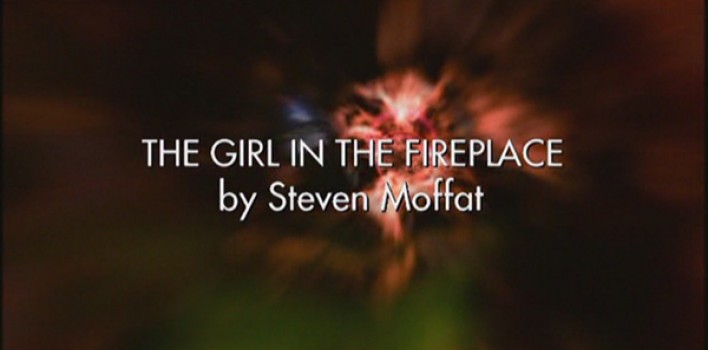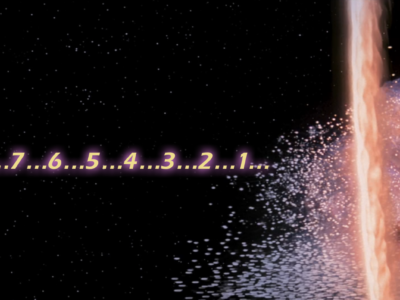Who-ology| S02E04 The Girl In the Fireplace
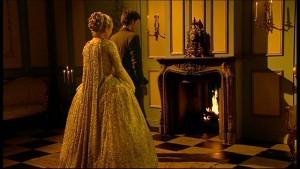 The “girl” in our title is the renown Madame de Pompadour of eighteenth century France. Known to us in this episode as Reinette, we are given a window (or several, as you will see) into both her life and inner self through this remarkable episode.
The “girl” in our title is the renown Madame de Pompadour of eighteenth century France. Known to us in this episode as Reinette, we are given a window (or several, as you will see) into both her life and inner self through this remarkable episode.
We quickly see that Reinette’s glamorous life is not quite so desirable an existence. She makes the most of the opportunities given her, but the best she can hope for is to be loved by someone for how clever and beautiful and well-bred she is. Despite how much she achieves in these areas, she will never win the full love and devotion of the man she seeks to woo–she can only hope to be his mistress, never a wife. She must constantly strive to maintain her image, and takes what value and love her “betters” deem she deserves.
Enter the hero: someone who is impressed by the soul of her and not her outward appearance, who appreciates the strength and worth of her inner self with clarity and admiration. The Doctor is this hero, of course.
But they enter into one another’s lives because of unusual circumstances—traumatic ones, at that. Reinette is being hunted by robotic beings whose expressed purpose is to harvest her brain when the “time is right”. The Doctor is unusually star-struck by Reinette—her intelligence and strength, poise and command—that he all but abandons Rose and Mickey in his single-minded mission to save her from this fate. She is nearly a match for him, which he begins to discover when he searches her mind for clues to solve the mystery of the robotic threat.
Reinette: “Doctor. So lonely. So very very alone.”
Doctor: “What do you mean, alone? You’ve never been alone in your life. {realizing} When did you start calling me Doctor?”
Reinette: “Such a lonely little boy. Lonely then and lonelier now. How can you bear it?”
Doctor: “How did you do that?”
Reinette: “A door once opened may be stepped through in either direction. Oh Doctor. My lonely Doctor. Dance with me.”
Doctor: “I can’t.”
Reinette: “Dance with me.”
Doctor: “This is the night you dance with the King.”
Reinette: “Then first I shall make him jealous.”
Doctor: “I can’t.”
Reinette: “Doctor. Doctor who? It’s more than just a secret, isn’t it?”
Doctor: “What did you see?”
Reinette: “That there comes a time, Time Lord, when every lonely little boy must learn how to dance.”
The Doctor goes about his investigation of the situation by stepping in and out of moments of Reinette’s life that the robots have created to monitor her life. With every encounter, the two fall more and more in love with each other. But these happen mere moments apart for the Doctor, while Reinette must endure years of waiting between each one.
Reinette: “There is a vessel in your world where the days of my life are pressed together like the chapters of the book, so that [the Doctor] may step from one to the other without increase of age while I, weary traveller, must always take the slower path.”
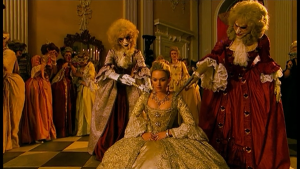 This metaphor of the “slow path” is so very apt to describe the human condition. We are always impatient to see what is on the “other side” of a circumstance, to achieve a goal, to have an answer, to reach fulfillment. This is no exception in the Christian life. It is the promise of God that the wholeness, satisfaction, and rest we desire is unquestionably our future, but His design is for us to take the slow path towards those things. Sometimes we’re able to trust the certainty of these promises, but more often than not, we are plagued with the same doubt and longing as everyone else as we wait for them to be realized.
This metaphor of the “slow path” is so very apt to describe the human condition. We are always impatient to see what is on the “other side” of a circumstance, to achieve a goal, to have an answer, to reach fulfillment. This is no exception in the Christian life. It is the promise of God that the wholeness, satisfaction, and rest we desire is unquestionably our future, but His design is for us to take the slow path towards those things. Sometimes we’re able to trust the certainty of these promises, but more often than not, we are plagued with the same doubt and longing as everyone else as we wait for them to be realized.
This is part of what it means to be human on our fragmented, fallen planet. In the midst of our agony, as we face the dangers, deaths, losses, fears, and uncertainties of our lives, it is easy to question why God has chosen to write our story as he has: our beginning in the perfect garden; our fall from the Great Lover; our return to his arms, opened wide for us on the cross; and the last day, its time unknown, when there will be a full and total restoration of our world.
In the midst of longing and grief over her altered life and the situation with the Doctor, Reinette reaches a remarkable conclusion that is worth pondering.
Reinette: “The monsters and the Doctor. It seems you cannot have one without the other.”
Rose: “Tell me about it. The thing is, you weren’t supposed to have either. Those creatures are messing with history. None of this was ever supposed to happen to you.”
Reinette: “Supposed to happen.”What does that mean? It happened, child. And I would not have it any other way. One may tolerate a world of demons for the sake of an angel.”
What a brave, bold way to face the uncertainties of life until the certainties are made manifest. This is ultimately what the Christian is asked to believe: that the monsters we face are necessary for us to truly see and know the Hero of our story.
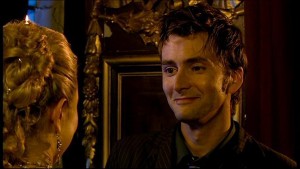 We are in the midst of the greatest love story that has been and ever will be told. All romances we encounter are merely a reflection of this first, true romance that undergirds all of creation. And we are the object of affection in this story. He, the King of the Universe, left all his riches and power behind in order to take full possession of his Bride—us. And according to the Gospel story, we must have the fall of the First Act and the darkness of the Second Act to reach the triumphant ending of the Third Act.
We are in the midst of the greatest love story that has been and ever will be told. All romances we encounter are merely a reflection of this first, true romance that undergirds all of creation. And we are the object of affection in this story. He, the King of the Universe, left all his riches and power behind in order to take full possession of his Bride—us. And according to the Gospel story, we must have the fall of the First Act and the darkness of the Second Act to reach the triumphant ending of the Third Act.
This is a great mystery that we will likely never understand. After all, we are on the slow path while the Writer of our story has the power to step in and out of time, to see the big picture. But all the love and beauty our aching hearts long for? If they are as magnificent as we perceive them to be, then gaining them would be worth “tolerating a world of demons.”


